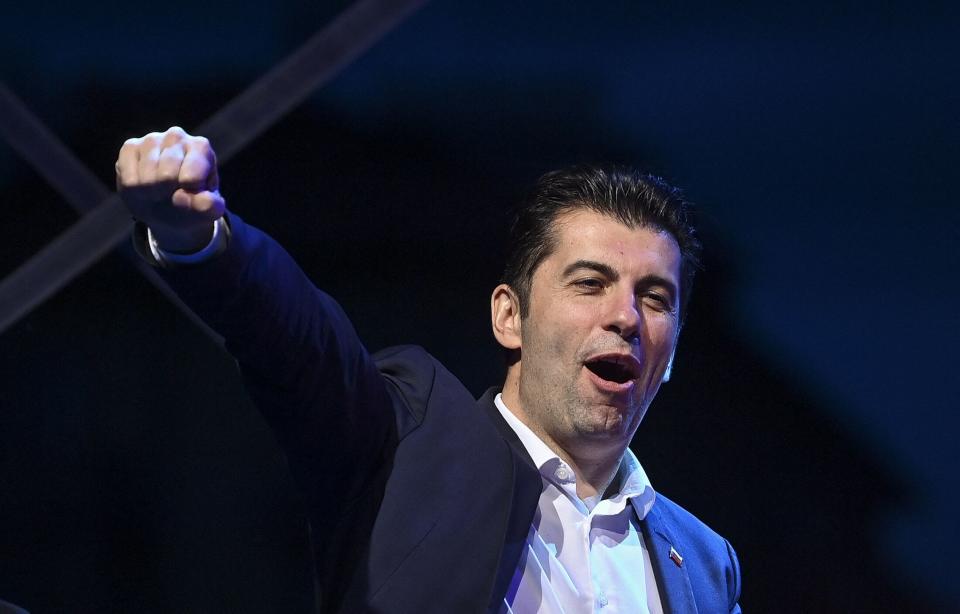Ex-Premier Borissov Wins Bulgaria Vote With Path to Rule Unclear
(Bloomberg) -- Former Prime Minister Boyko Borissov won Bulgaria’s fifth election in two years, but his failure to secure a majority threatens to extend a political stalemate undermining European Union unity over Russia’s war in Ukraine.
Most Read from Bloomberg
China’s Yuan Replaces Dollar as Most Traded Currency in Russia
Credit Suisse Chairman ‘Truly Sorry’ for Failure to Stem Crisis
A bloc led by Borissov’s Gerb party won 26.5%, according to official results with 93.4% of districts counted Monday. The bloc led by the arch-rival We Continue the Change party, led by former Prime Minister Kiril Petkov, won 25%. The outcome contradicted earlier exit polls and pre-election surveys that showed Borissov would come in second.
As many as four other parties also made it into parliament. They included a pro-Russian party, Revival, which came in third after suggesting Bulgaria could abandon its membership in the EU and NATO, and organizing a referendum to stop its efforts to adopt the euro.
The country of 6.5 million, the EU’s poorest, is looking for a way out of years of political deadlock after a string of inconclusive votes gave no political force enough support to muster a ruling majority. If the deadlock continues, another snap ballot may happen later this year.
During the two years of short-lived governments, most power has been in the hands of interim cabinets appointed by Rumen Radev.
A NATO-trained former fighter pilot and general who has represented Bulgaria at the EU level, he has taken pro-Moscow stances, including criticizing sanctions against Moscow as ineffective, saying Crimea is Russian and labeling opponents who support arming Ukraine as warmongers.
“The big difficulties in forming a government remain unchanged,” Boryana Dimitrova, managing partner at Alpha Research, told BNT television.
The crisis has deepened the Balkan country’s isolation in the EU, postponed its goal to enter the euro area next year, and delayed European Union recovery funding. The deadlock has also blocked the process for a 2023 budget bill, and central bank Governor Dimitar Radev (no relation to the president) remains in his post two years after his term expired because parties can’t agree on a replacement.
The war in Ukraine less than 300 miles away across the Black Sea has only exacerbated the chaos, adding to economic hardship by fueling the fastest inflation this century, which in turn is spurring anti-establishment sentiment.
With the margin tight, Borissov and Petkov refrained from commenting on the tally after voting ended Sunday and are expected to speak Monday. Whoever wins will be first to receive the government-forming mandate by President Radev.
But the projected distribution of mandates in the 240-seat parliament shows either Borissov or Petkov would need the support of the other’s party or at least two other political forces. Because of ideological and personal differences, making such a match could prove impossible.
Borissov has said he’ll hold talks with other parties to seek broader support, with one option a potential grand coalition between Gerb and We Continue the Change. If pursued, such a tie-up would probably be led by neither of the parties’ leaders.
“A scenario in which we can’t make a ruling majority will be a catastrophe for the country,” Borissov told reporters after casting his vote in his hometown of Bankya on Sunday, urging for an agreement that creates a stable cabinet.
Petkov, a Harvard-educated former business executive, has vowed to create a minority cabinet.
If both fail to win enough support to rule, Radev will have a third chance to pick a party to try to form a government before he will be obliged to schedule a new election.
“The political landscape remains deeply fragmented and challenges are becoming deeper,” said Capucine May, a political risk analyst at political consultancy Verisk Maplecroft.
(Updates with almost complete results.)
Most Read from Bloomberg Businessweek
Paris’s Air Taxi Stations Could Be Ready Before the Taxis Are
US and Europe Wrangle Over Green Subsidies to Avoid a Trade War
©2023 Bloomberg L.P.

 Yahoo News
Yahoo News 


